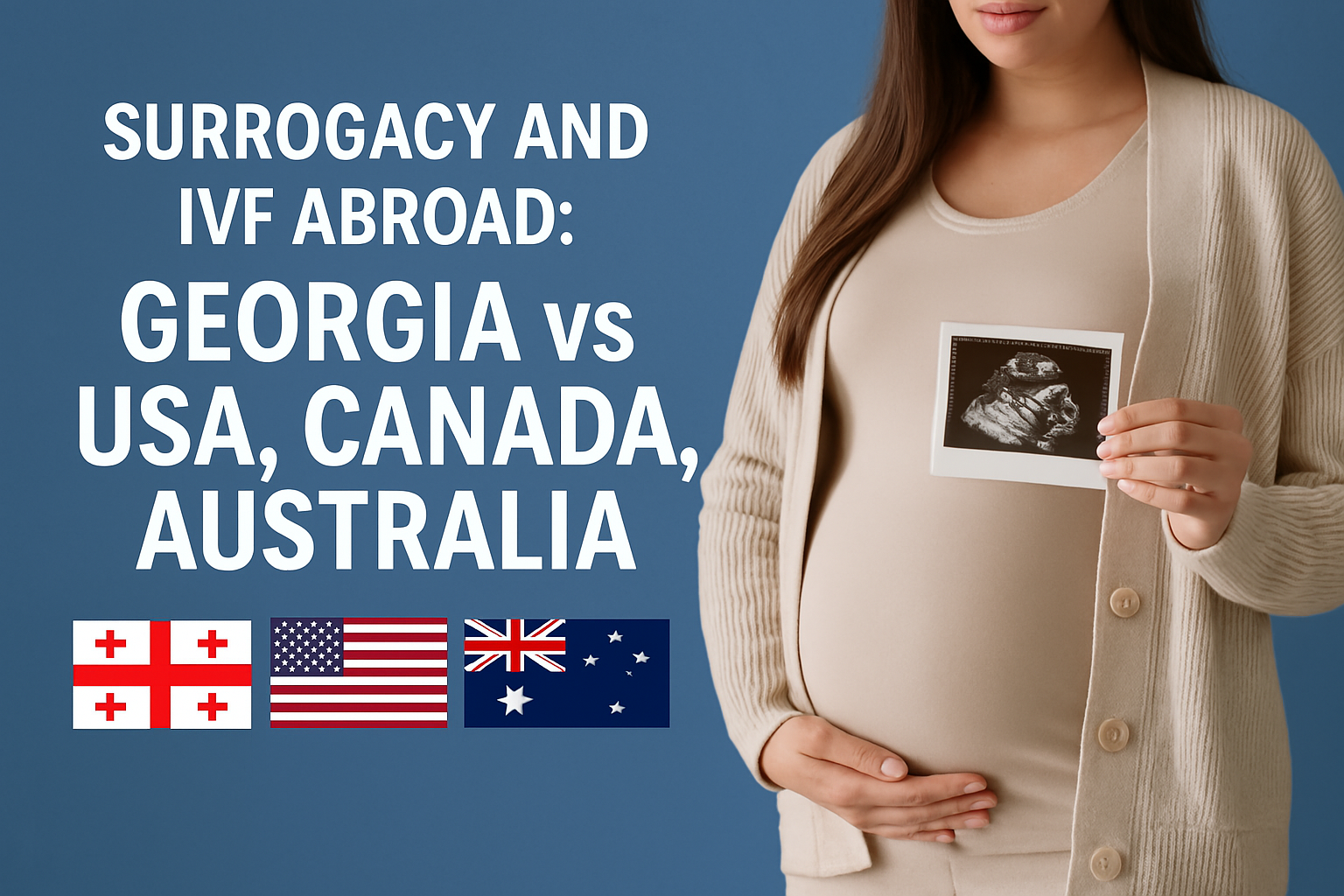The decision to grow a family through assisted reproduction is rarely made overnight. For many couples, especially those in the USA, Canada, or Australia, local restrictions, rising costs, and legal uncertainty push them to look abroad. One destination that consistently stands out is Georgia – and increasingly, Armenia. Here’s why.
The Legal Picture: Clarity vs. Complexity
In countries like the United States, surrogacy laws differ dramatically from one state to another. In some places, commercial surrogacy is permitted and well-regulated; in others, it’s banned outright. Even where legal, intended parents often need a court order after birth to establish legal parenthood. That introduces uncertainty – and time.
Canada, while more uniform, only permits altruistic surrogacy. The surrogate may be reimbursed for expenses but cannot be paid beyond that. For intended parents, this can mean long delays, limited surrogate availability, and complicated paperwork.
Australia takes a similarly restrictive approach. Commercial surrogacy is prohibited in all states and territories. Altruistic surrogacy is allowed but heavily regulated, and laws vary between states. In some regions, even arranging international surrogacy is a punishable offense.
Georgia, by contrast, offers a straightforward legal path. Commercial surrogacy is fully legal for heterosexual couples who are either married or have lived together for at least one year. The law is unambiguous: the intended parents are recognized as the legal parents from the moment of birth. Surrogates hold no parental rights. There’s no court process required, and documentation is handled seamlessly by the clinic.
For single intended parents, Armenia steps in. There, local legislation allows foreign nationals – both single men and single women – to pursue surrogacy using non-Armenian surrogate mothers, as long as they are biological parents of the child. The process is similar in structure to Georgia, with strong legal protections and streamlined parental recognition.
Cost Comparison: Savings Without Compromise
Reproductive care in North America and Australia is among the most expensive in the world. A single IVF cycle in the U.S. typically costs between $20,000 and $30,000 – and that’s before factoring in medications or embryo testing. Surrogacy, when available, often exceeds $120,000 and can climb to $180,000 once agency fees, legal expenses, and pregnancy-related costs are included.
Canada offers lower IVF costs – often between $10,000 and $15,000 — but public funding is limited and surrogacy remains unpaid by law, resulting in smaller surrogate pools and longer waiting lists.
In Australia, IVF pricing is comparable to Canada, but surrogacy is legally difficult, slow, and often relies on personal arrangements with friends or family.
SILK Medical offers complete surrogacy programs at a fraction of those costs:
- IVF with own eggs: from $5,500
- Egg donor IVF: from $7,500
- Surrogacy programs:
- $38,900 (single embryo transfer)
- $41,000 (up to three transfers)
- $51,000 (egg donation + three transfers)
- $70,000 (guaranteed live birth)
Even after adding travel and accommodation, the total remains far lower than programs in the patient’s home country.
Timing, Travel, and Convenience
One of the most attractive aspects of Georgia’s model is how fast and efficient it is. IVF at SILK Medical usually requires 14 days in Tbilisi for the female partner. With prior coordination, that can be reduced to just 4 days by doing part of the stimulation at home. For surrogacy, the typical surrogate matching time is up to 3 months – or even faster if needed.
Flights from major cities in the U.S., Canada, or Australia connect easily to Tbilisi or Yerevan via Europe or the Middle East. For most nationalities, no visa is required, or a visa is available upon arrival. Accommodation options range from $30 to $100 per night, and extended-stay apartments are available for longer visits.
Technology and Medical Expertise
Patients from advanced healthcare systems are understandably cautious when choosing care abroad. SILK Medical’s approach meets that standard – and often exceeds it.
The clinic is one of the few globally to use IVFID Witness, a radio-frequency identification system that prevents mix-ups of reproductive materials. The AI-powered EmbryoScope monitors embryo development with time-lapse imaging, improving success rates. All embryos undergo PGT-A testing, which includes gender selection when desired, and every cycle is supported by an experienced medical team that has completed over 1,500 IVF cycles in the last two years alone.
SILK’s guaranteed surrogacy programs have delivered a 100% live birth rate – with backup strategies already included in the program.
Who Is Eligible?
In Georgia, surrogacy is open to heterosexual couples (married or in stable relationships). The law requires a medical reason for surrogacy – for example, a condition that prevents safe pregnancy.
In Armenia, the options widen. Single women and single men can participate, provided they are the biological parent of the child and the surrogate is a non-Armenian citizen. This makes Armenia one of the very few countries where solo intended parents can access surrogacy legally and safely.
Same-sex couples are not eligible for surrogacy programs in Georgia or Armenia, but SILK Medical can refer interested patients to trusted partner agencies in Argentina or Mexico, where such programs are possible.
Why It’s Worth Considering
Patients from the U.S., Canada, and Australia are used to high standards, and often assume that traveling for treatment requires compromise. In the case of SILK Medical, the opposite is true. With clear legal protections, significant cost savings, a strong medical team, and fast timelines, the experience is both efficient and secure.
Many former patients describe the peace of mind they felt knowing the legal process would not drag on for months. Others say the affordability allowed them to pursue a second child or preserve embryos for future use.


